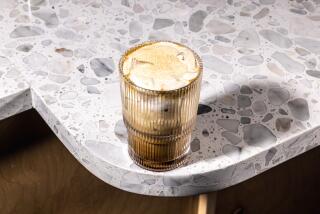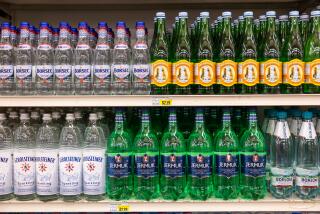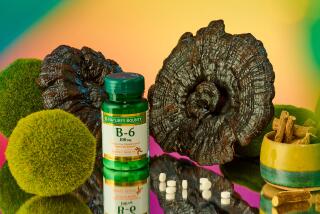Stiff Price, Good Sales : Japanese Energy Drinks Making Splash in Area Markets
It comes in a rum-colored bottle labeled “Yunker” and it tastes like cough medicine but--many of its users concede-- not as good.
Yunker is a Japanese vitamin drink with a price tag that is also a bit hard to swallow--a tiny, 1.69-ounce bottle, packaged in a shiny gold box, will set you back $6.99, plus tax. But that includes the straw.
The stiff price doesn’t seem to keep shoppers from snapping up Yunker and similar tonic drinks at Japanese markets and even a few more traditional American grocery stores in Los Angeles County.
At Yaohan Japanese Market in San Gabriel, the popular drinks--you can find them in the pharmaceutical and soft drink section--sometimes sell out.
Store manager Takeshi Kawano said he is not sure why people are hooked. Mostly Japanese people buy the drinks, but sometimes whites and Latinos as well, even though the tonics get little or no advertising in the United States.
“Maybe feel good, very fast,” Kawano said of the drink’s effect. “They think energy drink.”
Yunker and other vitamin drinks are the rage in Japan for their much ballyhooed ability to pump up tired bodies, increase sexual drive and perhaps even stave off karoshi, or death by overwork in the work-driven island nation.
In Japan, the drinks are a $1.57-billion industry, according to industry estimates, thanks to an advertising blitz that includes commercials featuring body-builder-turned actor Arnold Schwarzenegger zipping around on an oversized bottle of a vitamin-fortified drink. One swig of Alinamin V, the ad proclaims, and Schwarzenegger turns into “Devil King V.”
But in the United States, skeptics dispute claims that the vitamin drinks can make a person stronger.
“To my knowledge, I don’t think there is any drink that affects the structure of your body so you have more strength,” said Laurel Eu, a spokeswoman for the federal Food and Drug Administration office in Los Angeles.
Although Yunker wouldn’t quite fill a shot glass--and it’s gone in a single tip of the bottle--it, and similar drinks, provide a quick shot of energy, fans say. Others who use the drinks put the emphasis on the quick part.
“Five seconds, that’s all,” moaned 45-year-old Kenzo Yamada of Glendora, a Yunker drinker.
The drinks usually contain a mixture of vitamins and minerals. Sometimes they include such ingredients as caffeine, oyster extract and royal jelly bee extract. More exotic brews include essence of intimate parts of deer, turtles or snakes, but these more expensive concoctions are not available in the United States.
“I don’t think people would go for it,” said Ikoma Yoshiya, a salesman for Nishimoto Trading Co., the Los Angeles importer of Oronamin-C vitamin drink.
The FDA does not have any special import requirements for the Japanese drinks, spokesman Emil Corwin said.
U.S. sales figures are unavailable, but importers say the drinks are sold mostly in California, New York and Hawaii.
One of the tonic drinks, Lipovitan, has been sold at Vons, Ralphs, Pavilions and other American grocery stores since July, 1991, said Angela Balizada, a spokeswoman for the drink’s importer, Taisho Pharmaceutical. Lipovitan sells about 1 million bottles a year in the United States, she said.
Kam Mak, who is Chinese, says he sometimes splurges and buys a Yunker when he gets tired of stocking shelves at Yaohan market with shrimp-flavored chips, seasoned dried squid and clam jerky.
“I heard someone say after drinking it, it makes you stronger,” the 43-year-old La Puente resident said.
Monterey Park resident Jack Wilson, who taught English in Japan, said he first drank Oronamin-C when he was climbing Mt. Fuji.
He used it from time to time for energy, explained Wilson, 38, now a telephone company engineer. “When I felt tired and run-down.”
He added: “It didn’t help.”
On a recent morning at Yaohan market, he was pushing a cart full of groceries, including three bottles of Asahi Japanese beer.
“Get my vitamins right here now,” he joked.
More to Read
Eat your way across L.A.
Get our weekly Tasting Notes newsletter for reviews, news and more.
You may occasionally receive promotional content from the Los Angeles Times.









